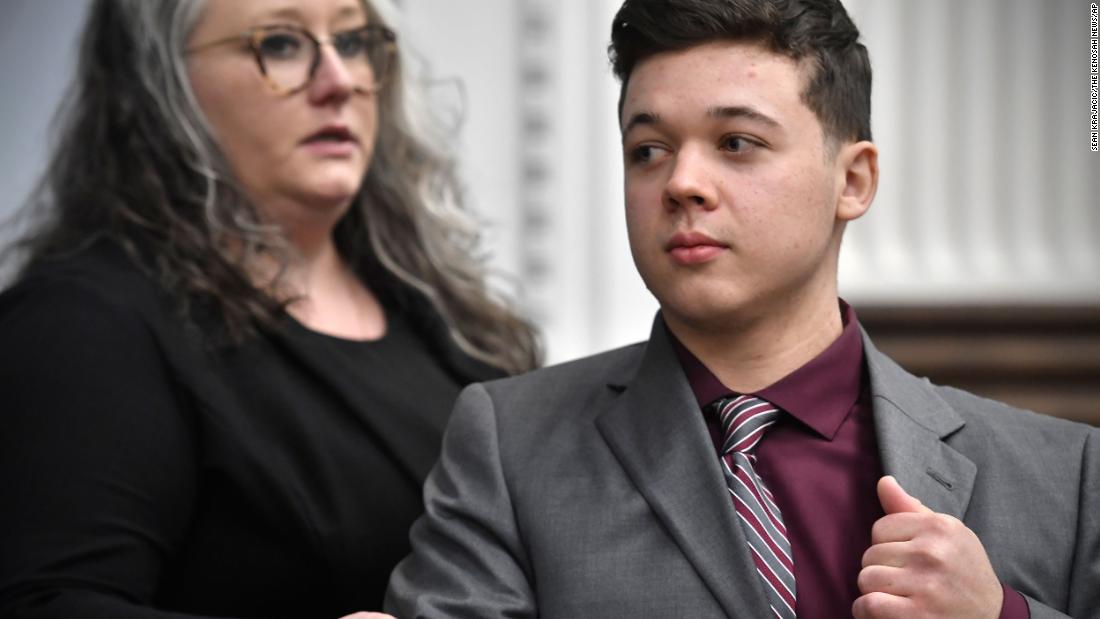Forensic pathologist testifies that a man killed by Rittenhouse during protests was first shot in the front and then hit by a fatal bullet to the back
The testimony so far has at times favored the prosecution’s case that Rittenhouse committed five felonies and a misdemeanor in Kenosha, Wisconsin, on the night of August 25, 2020. Yet other evidence — sometimes from the same witness — has bolstered the defense’s argument that Rittenhouse, then 17, acted in self-defense when he opened fire.
“I was never trying to kill the defendant,” Grosskreutz said. “In that moment, I was trying to preserve my own life, but doing so while taking the life of another is not something I am capable or comfortable doing.”
However, Grosskreutz also admitted that he pointed his gun at Rittenhouse before he was shot.
“When you were standing three to five feet from him with your arms up in the air, he never fired, right?” defense attorney Corey Chirafisi said.
“Correct,” Grosskreutz said.
“It wasn’t until you pointed your gun at him, advanced on him with your gun — now your hand is down pointed at him — that he fired, right?” Chirafisi asked.
“Correct,” Grosskreutz responded.
The paramedic also testified that his concealed carry license had expired, and he also admitted he incorrectly told investigators his gun had fallen out of his pants earlier in the night.
Rittenhouse, now 18, has pleaded not guilty to six charges, including first-degree intentional homicide, first-degree reckless homicide and first-degree attempted intentional homicide.
The prosecution called 15 witnesses last week, including police, witnesses who filmed the shootings and armed men out in Kenosha that night. Five other witnesses testified on Monday, and two more testified on Tuesday.
Defense focuses on Rosenbaum as aggressor
Defense attorney Mark Richards said Rittenhouse fired only in self-defense. In opening statements, he described Rosenbaum as the aggressor in the initial shooting and said Huber and Grosskreutz were part of a mob who “attacked him in the street like an animal.”
Rosenbaum had just been released from the hospital that morning, his fiancée Kariann Swart testified. She said he was on an antidepressant as well as medication to treat bipolar disorder.
Richie McGinniss, a video editor with The Daily Caller news site, testified that Rosenbaum had lunged for the front of Rittenhouse’s rifle moments before he was shot.
“It was as if, you know, if you were to lunge at somebody, if anybody were to lunge, they would probably stop themselves, you know, from falling face down on the ground, but the shots were fired in the exact instance that his momentum was going forward and that continued until Mr. Rosenbaum landed on the ground,” McGinniss said.
McGinniss was just feet from the two when Rittenhouse opened fire, and McGinniss said he jumped out of the line of fire and then shook his legs out to make sure he hadn’t been hit.
“Given where I was, certainly I was in danger,” he said.
McGinniss’ testimony is key to one of the charges against Rittenhouse — a felony count of first-degree recklessly endangering safety.
On Tuesday, a forensic pathologist testified that Rosenbaum was first shot in the front, bent forward into a horizontal position, and then was hit by a fatal bullet to the back.
Dr. Douglas Kelley with the Milwaukee County Medical Examiner’s Office testified that Rittenhouse shot Rosenbaum four times — twice in the front, once in the back and once along the side of his head. Video of the shooting shows Rittenhouse fired at Rosenbaum’s front, so Kelley determined that the fatal shot to his back came as his body leaned forward.
“The only time during the interaction in which he could have incurred the gunshot wounds to the back and to the right side of the head was when he was more horizontal, and the only time that happens is the last two gunshot wounds,” Kelley said. “The first two gunshot wounds are represented by the injury to the groin and the injury to the left thigh.”
Kelley said that horizontal position is consistent with a person either falling forward or lunging at someone. He also noted that Rosenbaum had a close-range gunshot wound to his hand.
“That hand was over the barrel of Mr. Rittenhouse’s gun when his hand was shot?” defense attorney Richards said.
“That makes sense,” Kelley responded.
CNN’s Carma Hassan and Julia Jones contributed to this report.
![]()


